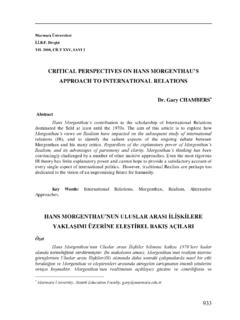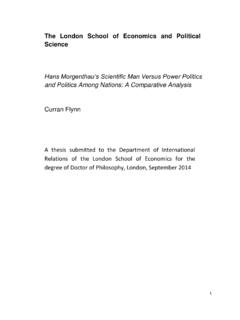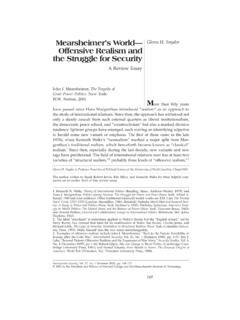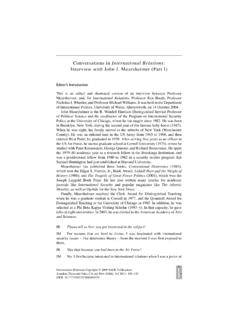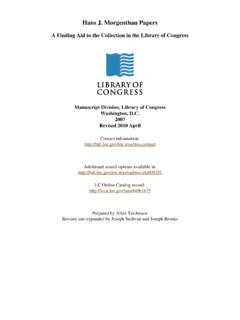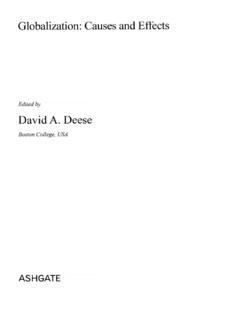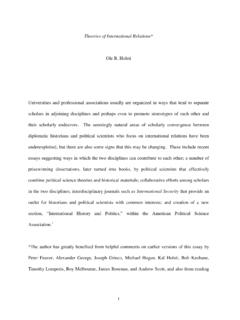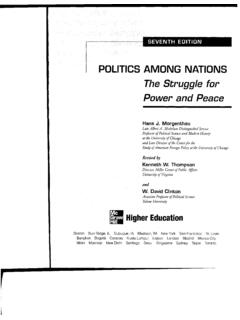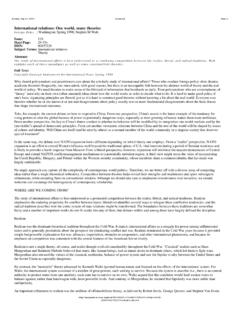Transcription of POLITICS AMONG NATIONS The Struggle for Power and Peace
1 SEVENTH EDITIONPOLITICS AMONG NATIONSThe Struggle forPower and PeaceHans J. MorgenthauLate Albert A. Michelson Distinguished ServiceProfessor of Political Science and Modern Historyat the University of Chicagoand Late Director of the Center for theStudy of American Foreign Policy at the University of ChicagoRevised byKenneth W. ThompsonDirector, Miller Center of Public AffairsUniversity of VirginiaandW. David ClintonAssociate Professor of Political ScienceTulane UniversityMeGrain/HillHigher EducationBoston Burr Ridge, IL Dubuque, IA Madison, Wl New York San Francisco St. LouisBangkok Bogota Caracas Kuala Lumpur Lisbon London Madrid Mexico CityMilan Montreal New Delhi Santiago Seoul Singapore Sydney Taipei Toronto I ContentsPREFACE vFOREWORD xviiPART ONETHEORY AND PRACTICE OF INTERNATIONAL POLITICSA REALIST THEORY OF INTERNATIONAL POLITICS 3 Six Principles of Political Realism 4 THE SCIENCE OF INTERNATIONAL POLITICS 17 Understanding International POLITICS 17 Different Approaches 17 Limitations to Understanding 19 Understanding the Problem of International Peace 24 PART TWOINTERNATIONAL POLITICS AS A Struggle FOR Power 273 POLITICAL Power 29 What Is Political Power ?
2 29As Means to the Nation's Ends 29 Its Nature: Four Distinctions 30 The Depreciation of Political Power 35 Two Roots of the Depreciation of Political Power 38 Nineteenth-Century Philosophy 39 The American Experience 39 The Science of Peace : Contemporary Utopianism 414 THE Struggle FOR Power : POLICY OF THE STATUS QUO 505 THE Struggle FOR Power : IMPERIALISM 56 What Imperialism Is Not 56 Economic Theories of Imperialism 59 The Marxist, Liberal, and "Devil" Theories of Imperialism 59 Criticism of These Theories 61 Different Types of Imperialism 64 Three Inducements to Imperialism 65 VIIviii ContentsVictorious War 65 Lost War 65 Weakness 66 Three Goals of Imperialism 66 'World Empire 67 Continental Empire 67 Local Preponderance 68 Three Methods of Imperialism 69 Military Imperialism 69 Economic Imperialism 70 How to Detect and Counter an Imperialistic Policy 74 The Problem of Policy.
3 Containment, Appeasement, Fear 75 The Problem of Detection 79B THE Struggle FOR Power : POLICY OF PRESTIGE 83 Diplomatic Ceremonial 84 Display of Military Force 89 Two Objectives of the Policy of Prestige 90 Three Corruptions of the Policy of Prestige 937 THE IDEOLOGICAL ELEMENT IN INTERNATIONAL POLICIES 97 The Nature of Political Ideologies 97 Typical Ideologies of Foreign Policies 100 Ideologies of the Status Quo 100 Ideologies of Imperialism 102 Ambiguous Ideologies 106 The Problem of Recognition 108 PART THREENATIONAL Power 1118 THE ESSENCE OF NATIONAL Power 113 What Is National Power ?
4 113 Roots of Modern Nationalism 116 Retreat from Nationalism: Apparent and Real 116 Personal Insecurity and Social Disintegration 1189 ELEMENTS OF NATIONAL Power 122 Geography 122 Natural Resources 124 Food 124 Raw Materials 126 The Power of Oil 127 Industrial Capacity 131 Military Preparedness 133 Technology 133 Leadership 135 Quantity and Quality of Armed Forces 136 Population 137 Distribution 137 Trends 139 National Character 140 Its Existence 140 The Russian National Character 142 National Character and National Power 145 National Morale 147 Its Instability 147 The Quality of Society and Government as Decisive Factors 149 The Quality of Diplomacy 152 The Quality of
5 Government 156 The Problem of Balance Between Resources and Policy 156 The Problem of Balance AMONG Resources 157 The Problem of Popular Support 158 Domestic Government and Foreign Policy 16210 EVALUATION OF NATIONAL Power 163 The Task of Evaluation 163 Typical Errors of Evaluation 166 The Absolute Character of Power 166 The Permanent Character of Power 168 The Fallacy of the Single Factor 170 Geopolitics 170 Nationalism 171 Militarism 173 'PART FOURLIMITATIONS OF NATIONAL POWERThe Balance of Power 7 7711 THE BALANCE OF Power 179 Social Equilibrium 179 Balance of Power as Universal Concept 179 Balance of Power in Domestic POLITICS 181 Two Main Patterns of the Balance of Power 184 The Pattern of Direct Opposition 184 The Pattern of Competition 186 Korea and the Balance of Power 18912 DIFFERENT METHODS OF THE BALANCE OF Power 190 Divide and Rule 190ountentsCompensations 191 Armaments 192 Alliances 193 The General Nature of Alliances 193 Alliances vs.
6 World Domination 198 Alliances vs. Counteralliances 200 The "Holder" of the Balance 20413 THE STRUCTURE OF THE BALANCE OF Power 209 Dominant and Dependent Systems 209 Structural Changes in the Balance of Power 21114 EVALUATION OF THE BALANCE OF Power 213 The Uncertainty of the Balance of Power 214 The Unreality of the Balance of Power 218 The Balance of Power as Ideology 222 The Inadequacy of the Balance of Power 224 Restraining Influence of a Moral Consensus 224 Moral Consensus of the Modern State System 228 PART FIVELIMITATIONS OF NATIONAL Power :International Morality and World Public Opinion 23315 MORALITY, MORES, AND LAWAS RESTRAINTS ON Power 23516 INTERNATIONAL MORALITY 240 The Protection of Human Life 241 Protection of Human Life in Peace 241 Protection of Human Life in War 244 Moral Condemnation of War 247 International Morality and Total War 248 Universal Morality vs.
7 Nationalistic Universalism 251 Personal Ethics of the Aristocratic International 251 Destruction of International Morality 255 Destruction of International Society 257 Victory of Nationalism over Internationalism 259 Transformation of Nationalism 261 Human Rights and International Morality 26517 WORLD PUBLIC OPINION 270 Psychological Unity of the World 272 Ambiguity of Technological Unification 273 The Barrier of Nationalism 275 PART SIXLIMITATIONS OF NATIONAL Power International Law 28118 THE MAIN PROBLEMS OF INTERNATIONAL LAW 283 The General Nature of International Law 283 The Legislative Function in International Law 286 Its Decentralized Character 286 Interpretation and Binding Force 289 The Judicial Function in International Law 292 Compulsory Jurisdiction 293 The Optional Clause 294 International Courts 297 The Effect of Judicial Decisions 299 The Enforcement of International Law 300 Its Decentralized Character 300 Treaties of Guaranty 303 Collective Security 304 Article 16 of the Covenant of the League of NATIONS 305 Chapter VII of the Charter of the United NATIONS 309 The Veto 312 The "Unitingfor Peace " Resolution 31419 SOVEREIGNTY 317 The General Nature of Sovereignty 317 Synonyms of Sovereignty.
8 Independence, Equality, Unanimity 319 What Sovereignty Is Not 321 How Sovereignty Is Lost 322 Majority Vote in International Organizations 326Is Sovereignty Divisible? 329 ,PART SEVENINTERNATIONAL POLITICS IN THE CONTEMPORARY WORLD 33520 THE NEW MORAL FORCE OF NATIONALISTIC UNIVERSALISM 337 Nationalism, Old and New 337 The Struggle for the Minds of Men 339 Three Principles of Propaganda 34121 THE NEW BALANCE OF Power 347 Inflexibility of the New Balance of Power 347 Numerical Reduction of Great Powers 347 The Bipolarity of Power 349 The Tendency Toward a Two-Bloc System 350xii ContentsDisappearance of the Balancer 351 The Problem of a "Third Force" 352 Disappearance of the Colonial Frontier 354 The Colonial Revolution 357 The Decline of the West 358 Potentialities of the Bipolar System 363 The Possibility of Its Breakup 363 Continuation of the Cold War 364 The New Diplomacy of Movement 366 Detente and
9 Peaceful Coexistence 37022 TOTAL WAR 377 War of Total Populations 379 War by Total Populations 382 War Against Total Populations 383 The Mechanization of Warfare 384 The Mechanization of Weapons 385 The Mechanization of Transportation and Communications 388 War for Total Stakes 389 Total Mechanization, Total War, and Total Dominion 392 PART EIGHTTHE PROBLEM OF Peace Peace Through Limitation 39923 DISARMAMENT 401 The Problem of Peace in Our Time 401 The History of Disarmament 403 The Failures 404 The Successes 407 Four Problems of Disarmament 408 The Ratio 408 The World Disarmament Conference 412 Disarmament Negotiations Since the Second World War 413 Standards of Allocation 414 Does Disarmament Mean Reduction of Armaments?
10 417 Does Disarmament Mean Peace ? 419 Arms Control in the Nuclear Age 42324 SECURITY 434 Collective Security 434 The Italo-Ethiopian War 440 The Korean War 441An International Police Force 44325 JUDICIAL SETTLEMENT 446 The Nature of the Judicial Function 446 Contents xiiiThe Nature of International Conflicts: Tensions and Disputes 448 Pure Disputes 449 Disputes with the Substance of a Tension 449 Disputes Representing a Tension 450 Limitations of the Judicial Function 45226 PEACEFUL CHANGE 455 Peaceful Change Within the State 455 Peaceful Change in International Affairs 459 Article 19 of the Covenant of the League of NATIONS 460 The Charter of the United NATIONS 46127 INTERNATIONAL GOVERNMENT 463 The Holy Alliance 463 History 463 Government by the Great Powers 465 Dual Meaning of the Status Quo 466 Peace , Order.


